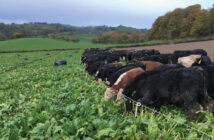The Farm Safety Foundation (Yellow Wellies) has published the results from its recent survey about the mental health and wellbeing of young farmers and agricultural workers in the UK, and its findings are very concerning.
Of the 450 farmers who were questioned, 94% confirmed that poor mental health is the greatest issue in the industry today, with concerns raised about the direct impact this is having on farm safety. Levels of wellbeing in the industry have steadily deteriorated over the past three years, with issues such as Brexit, the pandemic, supply chain shortages, the Ukraine war and issues in the egg and poultry sector being blamed.
Looking after and monitoring the mental health and wellbeing of farmers and those working in the agricultural industry is essential – the Office for National Statistics report that 36 suicides were recorded by those working in the farming and agricultural industry in 2021, whilst 22 farm workers lost their lives in fatal farm incidents in 2021-2022. A concerning finding of the study was that farmers with lower mental wellbeing scores (as marked by the Warwick Edinburgh Mental Wellbeing Scores) were less likely to actively ensure safety on the farm (e.g. wearing PPE or carrying out risk assessments). They were also more likely to take risks and less likely to consider the consequences of their actions and take personal responsibility for their safety.
Farm Safety Foundation’s campaign
The sixth annual ‘Mind Your Head’ campaign focuses on this issue, with over 300 farming organisations and charities coming together to tackle the stigma around poor mental health in the farming sector. Recognition of and support for the pressures on farmers and the impact this can have on farm safety will also be shared.
Manager of the Farm Safety Foundation, Stephanie Berkeley, said that the concerning deterioration in mental health levels in farming is compounded by barriers that farmers are experiencing in terms of talking about the challenges they are facing. The charities working to support the rural communities in the UK, however, have provided portals for farmers to access support.
She said: “Calls to rural support helplines have increased or become more complex over the past three years. For example: In Wales, Tir Dewi have noted 5-8 times the volume of calls to their helpline and The DPJ Foundation have made 47% more counselling referrals. In Northern Ireland, Rural Support have reported a 40% increase in calls to the support line; and, while call volumes to the Royal Agricultural Benevolent Institution and RSABI in Scotland have been consistent, the referrals and interactions have become more complex and require more of a multi-agency approach.
“Urgent action is needed to support the ongoing mental health of our farmers. We need to take the pressure off these rural support groups and charities who are increasingly relied upon to provide support for those in crisis situations.
Tragedy
Andy and Lynda Eadon from Warwickshire know more than most about the importance of recognising the signs and symptoms of someone struggling with their mental health. Having tragically lost their only son, Leonard, to suicide in January last year, they have been calling on young people in the farming community and asking them to support each other.
Leonard (Len) was a well-known 22 year old farmer completing his studies at Harper Adams university when he took his own life. His parents have been working with the Farm Safety Foundation team to raise awareness of how to recognise signs and symptoms of someone struggling amongst young farmers, as well as building skills to start those challenging conversations.

Lynda and Andy Eadon
In light of this, Mr Eadon devised the Five-a-Day Challenge in Len’s memory:
- Be honest with yourself and those around you
- Talk openly about daily challenges & LISTEN
- Care for yourself as well as you care for others
- Contact that person you’ve been saying you should
- Plan for the unexpected – make the right choices
Mrs Eadon said: “When Leonard died, it became a very strong feeling that we had to do something to bring people in the farming community together to talk. This is why Andy devised Five-a-Day Challenge – five very simple things you can do every day to look after your mental health. Over 18,000 of these bright red challenge cards have been printed and distributed to markets, local young farmers clubs and through the NFU Student Farmer magazine. We also commissioned 2,000 copies of the Farm Safety Foundation’s Little Book of Minding Your Head to be printed and distributed to YFCs to support the new mental health curve module that they have developed.”
She continued: “Our hope is that, because Leonard was so well known and it shocked so many people, we want people to keep talking about it and keep remembering him and realise that they need to be aware of what they’re feeling and reach out if they need it. There is no shame. There is no stigma. But there is support.”
For more information on the Mind Your Head campaign please visit www.yellowwellies.org or follow them on social media – @yellowwelliesUK on Facebook, Instagram and Twitter using the hashtag #MindYourHead.




